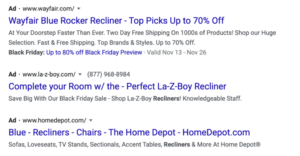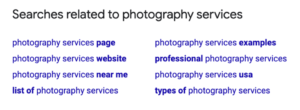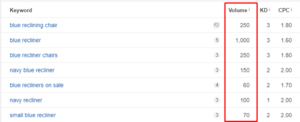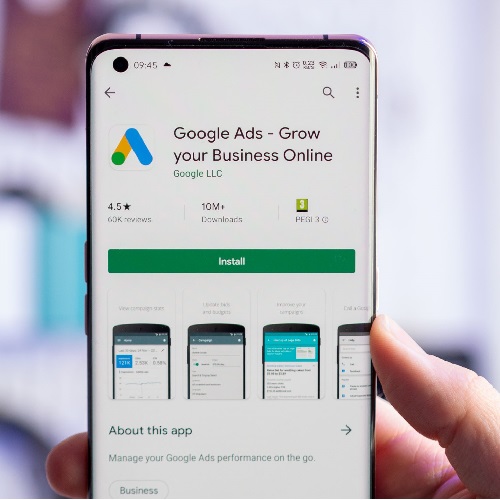
Contact Us
Related Posts
Category
Fun Fact- The top three pay-per-click (PPC) ads on the search result page get 46% clicks. The reason is, in the dynamic realm of digital advertising, Pay-Per-Click (PPC) campaigns reign supreme. These campaigns allow businesses to display their offerings directly to potential customers. However, selecting the right keywords is the key to a successful PPC campaign. Crafting a practical list of keywords requires diligent research and a strategic approach.
Finding the most suitable keyword is more challenging than it sounds. What keyword will work best for your business and services, and how can you find them? This comprehensive guide will walk you through eight superb methods to uncover better keywords for your PPC campaigns. So, buckle up and get ready to supercharge your PPC strategy!
Using PPC Keyword Effectively: 8-Steps to Follow.
In the dynamic landscape of online marketing, a well-crafted keyword strategy is the cornerstone for achieving optimal visibility and engagement. By meticulously selecting and integrating keywords, businesses can propel their content and ads to the forefront of search engine results pages (SERPs). Here, we delve into eight essential techniques to transform your keyword approach into a potent tool for attracting targeted audiences and enhancing your online presence.
Competitor Analysis
Spy on your competitors! Analyze their PPC ads and landing pages to discover which keywords they are targeting. Tools like SEMrush or SpyFu can help unveil the keywords driving their traffic. Conduct a thorough competitive analysis to identify the keywords that your rivals are using successfully. This insight can guide your keyword selection process, allowing you to tap into existing demand and potentially draw traffic away from competitors.
Utilize Long-Tail Keywords
Long-tail keywords are longer and more specific phrases that often have less competition. They tend to attract more qualified leads, making them an essential part of your keyword strategy. Steering your focus toward long-tail keywords can yield remarkable results. Although less frequently searched, these keywords tend to be more specific and targeted, driving higher conversion rates. Incorporate phrases that mirror user queries, addressing their precise needs and interests.

Target Branded Keywords
Amplify your brand’s online visibility by capitalizing on branded keywords. This ensures your brand’s prominence and offers a competitive advantage against similar brands. Branded keywords can lead potential customers directly to your products or services. For example, Tupperware would want to bid for “Tupperware plastic tiffin” because those keywords include their brand name, mainly since some people use “Tupperware” as a generic term for plastic boxes!
Craft Intent-Driven Ad Groups
Crafting ad groups around user intent can elevate your paid search campaigns. Tailor ads and keywords to align with different stages of the customer journey. Understand whether users are seeking information, evaluating options, or ready to make a purchase.
For example, you found the ten best keywords for your product and created two ads with them, called an ad group. Any of those keywords can target your list of keywords. Based on search intent, your advertising and keywords are grouped.
Optimize for Voice Search
The proliferation of voice-activated devices has spawned a new dimension in search behavior. Incorporating natural, conversational language into your keywords can cater to voice search queries. Anticipate questions users might ask aloud and tailor your keywords accordingly.
In simple words, with short keywords for written search, such as “Best Toothpaste for Sensitivity,” you can also target keywords for voice search, such as “Which is the best toothpaste for sensitivity.”
Include Variations and Synonyms
Keyword variation is a powerful tactic to broaden your content’s reach. Incorporate synonyms and related terms to capture diverse user intent. Google’s algorithms now decipher context, allowing your content to rank for multiple associated keywords.
For example, instead of bidding for “photography services,” you can bid for “professional photographer” or “photography studio” because such keywords will drive the same traffic, and the bid would be economical compared to the first one.

Find the Balance Between Competition and Search Volume
Striking the proper equilibrium between keyword competition and search volume is pivotal. High-competition keywords may grant visibility but might be arduous to rank for. Conversely, low-competition keywords might not yield sufficient traffic. A judicious mix is critical. The inquiries also produce less traffic because they are more focused. It would be best if you chose keywords that successfully strike a balance between the two. You want to look for specialized keywords to produce credible traffic and have a sizable amount of traffic.
You can see the search volume of different keywords using a Google keywords tool like Google Keyword Planner or Ahrefs.

Consider Negative Keywords
Strategically deploying negative keywords can refine your targeting, ensuring your content appears in relevant contexts. By excluding specific keywords, you prevent your content from appearing in unrelated searches, enhancing your click-through rates and quality score.
For instance, if you are creating an ad for glass solutions, you would not want to target the keyword “eyeglasses” since you are not selling them. The word “eye” would consider a negative keyword, and you would like to avoid that.
Get More Help Finding PPC Keywords from OMR Digital
In conclusion, nailing your PPC keyword research can significantly impact the success of your online advertising efforts. By following these eight superb methods, you’ll be equipped with a powerhouse list of keywords to drive targeted traffic, boost conversions, and propel your business toward digital triumph.
However, Remember, it’s not just about finding keywords; it’s about finding the right keywords that resonate with your audience’s needs and preferences. Ready to take your PPC campaigns to the next level? Partner with OMR Digital, your trusted digital marketing companion. Our team of experts specializes in keyword research, ensuring your campaigns are armed with the most effective keywords for optimal results. Whether you’re a small business looking to expand or an established brand aiming for greater reach, OMR Digital has the solutions to elevate your PPC game.
To avail of our best services at the most affordable prices, you can contact us via email at info@omrdigital.com or phone at +91-898-954-3589. Connect with us today and help your business boost using effective keywords for PPC advertising!

Fun Fact- The top three pay-per-click (PPC) ads on the search result page get 46% clicks. The reason is, in the dynamic realm of digital advertising, Pay-Per-Click (PPC) campaigns reign supreme. These campaigns allow businesses to display their offerings directly to potential customers. However, selecting the right keywords is the key to a successful PPC campaign. Crafting a practical list of keywords requires diligent research and a strategic approach.
Finding the most suitable keyword is more challenging than it sounds. What keyword will work best for your business and services, and how can you find them? This comprehensive guide will walk you through eight superb methods to uncover better keywords for your PPC campaigns. So, buckle up and get ready to supercharge your PPC strategy!
Using PPC Keyword Effectively: 8-Steps to Follow.
In the dynamic landscape of online marketing, a well-crafted keyword strategy is the cornerstone for achieving optimal visibility and engagement. By meticulously selecting and integrating keywords, businesses can propel their content and ads to the forefront of search engine results pages (SERPs). Here, we delve into eight essential techniques to transform your keyword approach into a potent tool for attracting targeted audiences and enhancing your online presence.
Competitor Analysis
Spy on your competitors! Analyze their PPC ads and landing pages to discover which keywords they are targeting. Tools like SEMrush or SpyFu can help unveil the keywords driving their traffic. Conduct a thorough competitive analysis to identify the keywords that your rivals are using successfully. This insight can guide your keyword selection process, allowing you to tap into existing demand and potentially draw traffic away from competitors.
Utilize Long-Tail Keywords
Long-tail keywords are longer and more specific phrases that often have less competition. They tend to attract more qualified leads, making them an essential part of your keyword strategy. Steering your focus toward long-tail keywords can yield remarkable results. Although less frequently searched, these keywords tend to be more specific and targeted, driving higher conversion rates. Incorporate phrases that mirror user queries, addressing their precise needs and interests.

Target Branded Keywords
Amplify your brand’s online visibility by capitalizing on branded keywords. This ensures your brand’s prominence and offers a competitive advantage against similar brands. Branded keywords can lead potential customers directly to your products or services. For example, Tupperware would want to bid for “Tupperware plastic tiffin” because those keywords include their brand name, mainly since some people use “Tupperware” as a generic term for plastic boxes!
Craft Intent-Driven Ad Groups
Crafting ad groups around user intent can elevate your paid search campaigns. Tailor ads and keywords to align with different stages of the customer journey. Understand whether users are seeking information, evaluating options, or ready to make a purchase.
For example, you found the ten best keywords for your product and created two ads with them, called an ad group. Any of those keywords can target your list of keywords. Based on search intent, your advertising and keywords are grouped.
Optimize for Voice Search
The proliferation of voice-activated devices has spawned a new dimension in search behavior. Incorporating natural, conversational language into your keywords can cater to voice search queries. Anticipate questions users might ask aloud and tailor your keywords accordingly.
In simple words, with short keywords for written search, such as “Best Toothpaste for Sensitivity,” you can also target keywords for voice search, such as “Which is the best toothpaste for sensitivity.”
Include Variations and Synonyms
Keyword variation is a powerful tactic to broaden your content’s reach. Incorporate synonyms and related terms to capture diverse user intent. Google’s algorithms now decipher context, allowing your content to rank for multiple associated keywords.
For example, instead of bidding for “photography services,” you can bid for “professional photographer” or “photography studio” because such keywords will drive the same traffic, and the bid would be economical compared to the first one.

Find the Balance Between Competition and Search Volume
Striking the proper equilibrium between keyword competition and search volume is pivotal. High-competition keywords may grant visibility but might be arduous to rank for. Conversely, low-competition keywords might not yield sufficient traffic. A judicious mix is critical. The inquiries also produce less traffic because they are more focused. It would be best if you chose keywords that successfully strike a balance between the two. You want to look for specialized keywords to produce credible traffic and have a sizable amount of traffic.
You can see the search volume of different keywords using a Google keywords tool like Google Keyword Planner or Ahrefs.

Consider Negative Keywords
Strategically deploying negative keywords can refine your targeting, ensuring your content appears in relevant contexts. By excluding specific keywords, you prevent your content from appearing in unrelated searches, enhancing your click-through rates and quality score.
For instance, if you are creating an ad for glass solutions, you would not want to target the keyword “eyeglasses” since you are not selling them. The word “eye” would consider a negative keyword, and you would like to avoid that.
Get More Help Finding PPC Keywords from OMR Digital
In conclusion, nailing your PPC keyword research can significantly impact the success of your online advertising efforts. By following these eight superb methods, you’ll be equipped with a powerhouse list of keywords to drive targeted traffic, boost conversions, and propel your business toward digital triumph.
However, Remember, it’s not just about finding keywords; it’s about finding the right keywords that resonate with your audience’s needs and preferences. Ready to take your PPC campaigns to the next level? Partner with OMR Digital, your trusted digital marketing companion. Our team of experts specializes in keyword research, ensuring your campaigns are armed with the most effective keywords for optimal results. Whether you’re a small business looking to expand or an established brand aiming for greater reach, OMR Digital has the solutions to elevate your PPC game.
To avail of our best services at the most affordable prices, you can contact us via email at info@omrdigital.com or phone at +91-898-954-3589. Connect with us today and help your business boost using effective keywords for PPC advertising!














